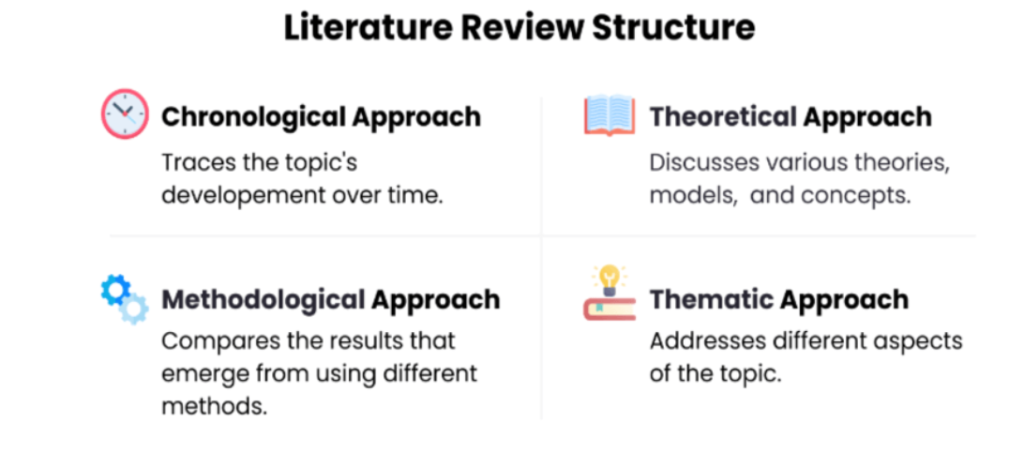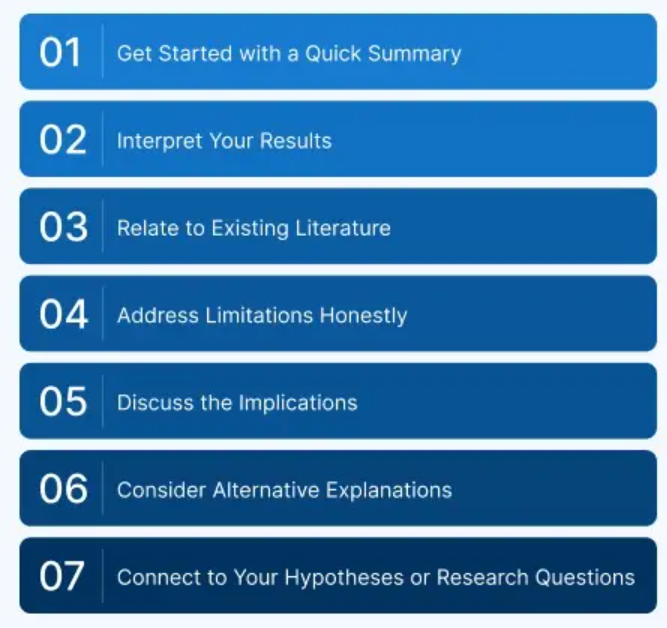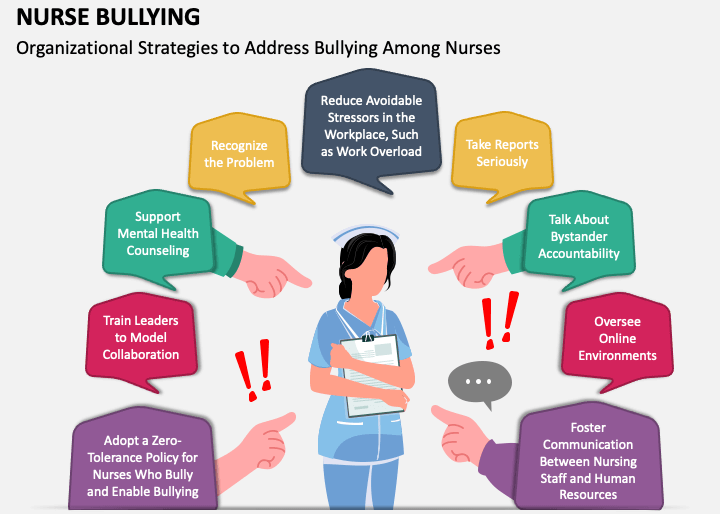
Table of Contents
Embarking on a PhD journey in nursing is a significant achievement, signaling dedication and commitment to advancing the field. A cornerstone of this journey is the ability to produce high-quality, impactful scholarly work. PhD nursing paper writing can be a daunting prospect, demanding rigorous research, critical analysis, and clear communication.
This comprehensive guide aims to equip you with the knowledge and strategies necessary to excel in PhD nursing paper writing and navigate the intricacies of academic publishing.
Understanding the Landscape of PhD Nursing Paper Writing
Before diving into the specifics, it’s crucial to grasp the overall expectations for PhD nursing paper writing. Unlike undergraduate or even master’s level work, a PhD paper is expected to contribute original knowledge to the field. It should demonstrate:
- Deep Understanding: A thorough comprehension of the relevant literature and theoretical frameworks.
- Critical Thinking: The ability to analyze existing research, identify gaps, and formulate insightful arguments.
- Originality: A novel contribution to the body of knowledge in nursing, whether through a new research finding, a innovative theoretical perspective, or a significant methodological advancement.
- Rigorous Methodology: Adherence to established research methods, ensuring the validity and reliability of findings.
- Clear Communication: Precise and concise writing that effectively conveys complex ideas to a scholarly audience.
What Makes PhD Nursing Paper Writing Different?
- Depth of Research: PhD-level papers require extensive literature reviews and a thorough understanding of the nuances within your chosen area.
- Analytical Rigor: Mere summarization is insufficient. You must critically evaluate existing research, identify limitations, and synthesize information to support your arguments.
- Contribution to Knowledge: This is the core differentiator. Your paper must offer something new, be it a novel finding, a new interpretation, or a refined methodology.
- Ethical Considerations: Upholding the highest ethical standards is paramount. This includes informed consent, data privacy, and responsible conduct of research.
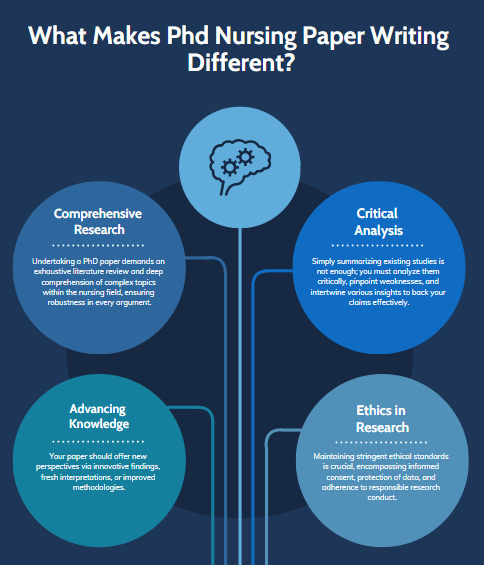
Planning and Preparing for Your PhD Nursing Paper
Effective planning is the foundation of successful PhD nursing paper writing. Before even beginning to write, consider these key steps:
- Choosing a Topic: This is perhaps the most crucial decision.
- Passion and Interest: Select a topic that genuinely excites you. This will fuel your motivation and make the writing process more enjoyable.
- Significance: Ensure your chosen topic is relevant and addresses an important issue within the field of nursing.
- Feasibility: Consider the resources, time, and expertise required to conduct the necessary research.
- Novelty: Ideally, your topic should address a gap in the literature or offer a fresh perspective on an existing problem.
- Developing a Research Question or Hypothesis: A well-defined research question or hypothesis provides a clear focus for your research.
- Specific: Clearly articulate what you are investigating.
- Measurable: Define how you will measure or assess the variables under study.
- Achievable: Ensure that your research question can be answered within the scope of your PhD study.
- Relevant: Connect your research question to broader issues within the field of nursing.
- Time-bound: Define the timeframe for completing your research.
- Conducting a Comprehensive Literature Review: The literature review is the cornerstone of your PhD nursing paper writing.
- Identify Key Studies: Locate and critically analyze the most relevant and influential studies in your field.
- Synthesize Information: Don’t just summarize individual articles; synthesize the findings to identify patterns, contradictions, and gaps in the literature.
- Develop a Theoretical Framework: Identify or develop a theoretical framework to guide your research and provide a context for interpreting your findings.
- Use Databases Effectively: Familiarize yourself with relevant databases, such as PubMed, CINAHL, and Scopus, to conduct thorough searches.
- Selecting a Research Methodology: The appropriate research methodology depends on your research question and the nature of your study.
- Quantitative Methods: Suitable for studies involving numerical data and statistical analysis. Examples include surveys, experiments, and correlational studies.
- Qualitative Methods: Appropriate for exploring complex phenomena and gaining in-depth understanding of experiences and perspectives. Examples include interviews, focus groups, and ethnographic studies.
- Mixed Methods: Combines both quantitative and qualitative approaches to provide a more comprehensive understanding of the research topic.
- Developing a Detailed Research Proposal: A well-structured research proposal is essential for securing funding and obtaining ethical approval.
- Introduction: Clearly state the purpose of your research and its significance.
- Literature Review: Summarize the relevant literature and identify the gaps in knowledge that your study will address.
- Research Question/Hypothesis: Clearly state your research question or hypothesis.
- Methodology: Describe your research design, data collection methods, and data analysis techniques.
- Timeline: Provide a realistic timeline for completing your research.
- Budget: Outline the costs associated with your research.
Structuring Your PhD Nursing Paper
A well-organized structure is crucial for ensuring clarity and coherence in your PhD nursing paper. The typical structure for PhD nursing paper writing includes:
- Abstract: A concise summary of your paper, highlighting the key findings and conclusions.
- Introduction: Provides background information, states the research problem, and outlines the purpose of the study.
- Literature Review: Critically analyzes existing research and identifies the gaps in knowledge that your study will address.
- Methodology: Describes the research design, data collection methods, and data analysis techniques.
- Results: Presents the findings of your research in a clear and objective manner.
- Discussion: Interprets the findings, discusses their implications, and relates them to the existing literature.
- Conclusion: Summarizes the key findings, draws conclusions, and suggests future research directions.
- References: Lists all the sources cited in your paper.
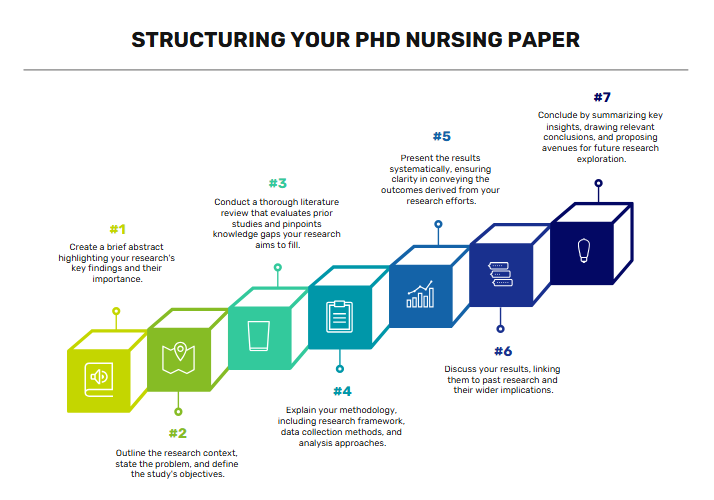
Writing with Clarity and Precision
Effective communication is paramount in PhD nursing paper writing. Adhere to the following guidelines:
- Use Clear and Concise Language: Avoid jargon and unnecessary complexity.
- Maintain a Formal Tone: Use appropriate academic language and avoid colloquialisms.
- Support Your Arguments with Evidence: Back up your claims with data, statistics, and references to the literature.
- Ensure Logical Flow: Organize your ideas logically and use transition words to connect sentences and paragraphs.
- Proofread Carefully: Check for errors in grammar, spelling, and punctuation.
Mastering the Art of Referencing
Proper referencing is essential for avoiding plagiarism and giving credit to the original authors. Familiarize yourself with the preferred citation style for your field (e.g., APA, MLA, Chicago).
- Use a Citation Management Tool: Tools like EndNote, Zotero, and Mendeley can help you manage your references and format citations automatically.
- Be Consistent: Use the same citation style throughout your paper.
- Double-Check Your References: Ensure that all references are accurate and complete.
Seeking Feedback and Revision
Revision is an integral part of the PhD nursing paper writing process.
- Seek Feedback from Your Advisor: Your advisor is your primary resource for guidance and feedback.
- Ask Peers for Feedback: Peer review can provide valuable insights and identify areas for improvement.
- Revise and Edit Multiple Times: Don’t be afraid to revise your paper multiple times to refine your arguments and improve the clarity of your writing.
Trending Topics for Your PhD Nursing Paper
Securing a compelling and relevant topic is the crucial first step in embarking on your PhD journey. For nursing students, the landscape of healthcare is constantly evolving, presenting a wealth of exciting research opportunities. Choosing a trending topic not only ensures your research remains contemporary but also increases its potential impact within the field. Here are five trending areas to consider for your PhD nursing paper writing:
1. Telehealth and Remote Patient Monitoring:
The COVID-19 pandemic dramatically accelerated the adoption of telehealth and remote patient monitoring. This surge presents rich opportunities for nursing research.
- Research Focus: Explore the effectiveness of telehealth interventions for specific chronic conditions like diabetes or heart failure. Investigate the impact of remote patient monitoring on adherence to medication regimens. Analyze the ethical considerations surrounding data privacy and accessibility in telehealth settings.
2. Mental Health Integration in Primary Care:
The growing recognition of the importance of mental health and its integration into primary care settings is a significant trend.
- Research Focus: Develop and evaluate integrated care models that address both physical and mental health needs. Explore the role of nurses in identifying and managing mental health conditions within primary care settings. Investigate the impact of integrated care on patient outcomes, such as reducing hospital readmissions and improving quality of life.

3. Addressing Health Equity and Disparities:
Health equity is a pressing concern, and nursing research plays a crucial role in identifying and addressing disparities in healthcare access and outcomes.
- Research Focus: Investigate the root causes of health disparities in specific populations, such as racial and ethnic minorities or rural communities. Develop and evaluate interventions to improve access to care and reduce disparities in chronic disease management. Explore the role of culturally tailored interventions in promoting health equity.
4. The Impact of Artificial Intelligence (AI) on Nursing Practice:
AI is rapidly transforming healthcare, and its impact on nursing practice is a burgeoning area of research.
- Research Focus: Explore the use of AI-powered tools to improve patient monitoring and early detection of adverse events. Investigate the ethical implications of using AI in nursing decision-making. Develop and evaluate training programs to prepare nurses for the integration of AI into their practice.
5. Palliative Care and End-of-Life Nursing:
With an aging population, the demand for palliative care and end-of-life nursing services is increasing. This area presents opportunities to improve patient comfort and quality of life.
- Research Focus: Develop and evaluate interventions to improve pain management and symptom control in patients receiving palliative care. Explore the impact of advance care planning on end-of-life experiences. Investigate the psychosocial needs of patients and families facing end-of-life care.
Choosing one of these trending topics provides a strong foundation for your PhD nursing paper writing. Remember to consult with your advisors and conduct a thorough literature review to identify specific research gaps and develop a focused research question. With careful planning and rigorous methodology, you can contribute valuable knowledge to the field of nursing.
The Common Mistakes to Avoid in PhD Nursing Paper Writing
Embarking on a PhD journey in nursing is a challenging yet rewarding experience. A significant part of this journey involves mastering the art of academic writing, specifically PhD nursing paper writing. While the depth of research and critical analysis required is understood, many doctoral candidates stumble into common pitfalls that can hinder the quality and impact of their work. Avoiding these mistakes is crucial for ensuring your research contributes meaningfully to the field of nursing. The following are some of the most frequent errors made during PhD nursing paper writing and how to navigate them.
Neglecting Thorough Literature Review
One of the most fundamental mistakes in PhD nursing paper writing is a superficial or incomplete literature review. A strong literature review is the bedrock of any good research paper, particularly in PhD nursing paper writing. It demonstrates your understanding of the existing knowledge base, identifies gaps in the literature, and justifies the need for your research.
- Mistake: Skimming through articles without critically evaluating their methodology, findings, and relevance.
- Consequence: Leads to weak arguments, redundant research, and an inability to contextualize your work within the broader field.
- Solution: Employ a systematic approach to literature searching, using relevant databases (PubMed, CINAHL, Scopus). Critically appraise each study for its strengths and limitations. Synthesize the literature to identify key themes, controversies, and areas for further investigation. Develop a concept map to visualize the connections between different studies.
Lack of Clarity and Focus in the Research Question
A vague or overly broad research question is a recipe for disaster. A poorly defined research question can lead to unfocused data collection, analysis, and ultimately, a weak and inconclusive paper.
- Mistake: Formulating a question that is too general or lacks specific variables and outcomes.
- Consequence: Makes it difficult to design a rigorous study, analyze data effectively, and draw meaningful conclusions.
- Solution: Refine your research question through iterative discussions with your advisor. Ensure the question is specific, measurable, achievable, relevant, and time-bound (SMART). Clearly define the population, intervention, comparison (if applicable), and outcome (PICO) of your research.
Methodological Weaknesses
Choosing an inappropriate research design or failing to adequately justify your chosen methods can severely undermine the credibility of your PhD nursing paper writing. This is particularly true when it comes to PhD nursing paper writing.
- Mistake: Selecting a research design that does not align with your research question. Failing to address potential biases or limitations in your chosen methodology.
- Consequence: Produces unreliable or invalid results, hindering the ability to draw meaningful conclusions and contribute to the body of nursing knowledge.
- Solution: Carefully consider the strengths and limitations of different research designs. Justify your chosen methodology based on its suitability for addressing your specific research question. Implement strategies to minimize potential biases, such as random sampling, blinding, and data triangulation. Clearly articulate the limitations of your study and acknowledge their potential impact on the findings.
Inadequate Data Analysis and Interpretation
Even with robust data, improper analysis or misinterpretation can lead to misleading conclusions. The ability to accurately analyze and interpret data is crucial for successful PhD nursing paper writing.
- Mistake: Using inappropriate statistical tests or failing to adequately explain the rationale for your chosen analytical methods. Over-interpreting data or drawing conclusions that are not supported by the evidence.
- Consequence: Leads to flawed conclusions, which can negatively impact clinical practice and future research.
- Solution: Consult with a statistician or experienced researcher to ensure you are using the appropriate analytical methods. Clearly explain the rationale for your chosen methods and provide justification for any assumptions made. Interpret your findings cautiously, avoiding overgeneralization or speculation. Acknowledge the limitations of your data and avoid drawing conclusions that are not supported by the evidence.
Poor Writing and Organization
Even with excellent research, poor writing and organization can detract from the overall quality of your paper. Clear and concise communication is essential for effectively conveying your research findings.
- Mistake: Using jargon excessively, lacking a clear and logical structure, and failing to proofread carefully for grammatical errors and typos.
- Consequence: Makes it difficult for readers to understand your research and appreciate its significance.
- Solution: Use clear and concise language, avoiding unnecessary jargon. Organize your paper logically, using headings and subheadings to guide the reader. Develop a strong introduction that clearly states your research question and objectives. Provide a detailed explanation of your methods and results. Discuss the implications of your findings in the context of existing literature. Proofread your paper carefully for grammatical errors, typos, and inconsistencies. Consider asking a colleague or writing center for feedback on your writing. Remember that PhD nursing paper writing requires precision and clarity.
Lack of Ethical Considerations
Failing to address ethical considerations can seriously jeopardize your research and your reputation. Ethical research is paramount in PhD nursing paper writing and the nursing profession.
- Mistake: Not obtaining informed consent from participants, failing to protect participant confidentiality, or neglecting to address potential conflicts of interest.
- Consequence: Can lead to harm to participants, legal repercussions, and damage to your professional reputation.
- Solution: Obtain ethical approval from your institutional review board (IRB) before commencing your research. Ensure that you obtain informed consent from all participants, clearly explaining the purpose of the study, the risks and benefits of participation, and their right to withdraw at any time. Protect participant confidentiality by anonymizing data and storing it securely. Disclose any potential conflicts of interest that could bias your research.
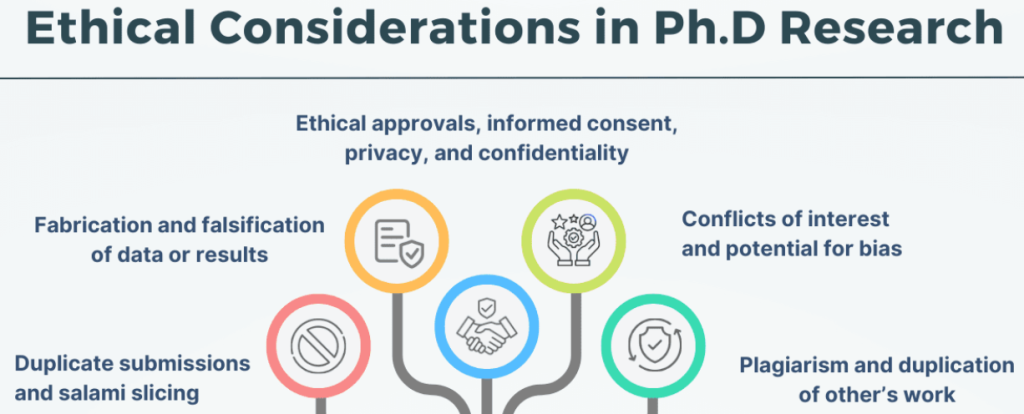
By diligently avoiding these common mistakes, doctoral candidates can significantly improve the quality and impact of their PhD nursing paper writing, contributing meaningfully to the advancement of nursing knowledge and practice.
Navigating the Publishing Process
Once your paper is complete, consider publishing it in a peer-reviewed journal.
- Choose the Right Journal: Select a journal that is relevant to your research topic and audience.
- Follow the Journal’s Guidelines: Carefully review the journal’s guidelines for authors and ensure that your paper meets their requirements.
- Submit Your Paper Online: Most journals require electronic submission of manuscripts.
- Respond to Reviewer Comments: Be prepared to revise your paper based on the feedback from peer reviewers.
The Importance of Ethical Considerations in PhD Nursing Paper Writing
Ethical considerations are fundamental to PhD nursing research paper writing. Your research must adhere to strict ethical guidelines to protect participants and ensure the integrity of your findings. Key ethical principles include:
- Informed Consent: Obtaining voluntary and informed consent from participants before their involvement in the study.
- Confidentiality: Protecting the privacy and confidentiality of participants’ data.
- Beneficence: Maximizing benefits and minimizing risks for participants.
- Justice: Ensuring that the benefits and burdens of research are distributed fairly.
- Integrity: Maintaining honesty and transparency in all aspects of your research.
Violating these ethical principles can have serious consequences, including retraction of your paper and damage to your reputation.
Conclusion: Embracing the Journey of PhD Nursing Paper Writing
PhD nursing paper writing is a challenging but rewarding process. By following the guidelines outlined in this guide, you can develop the skills and knowledge necessary to produce high-quality scholarly work that contributes to the advancement of the nursing profession. Remember to embrace the journey, seek feedback, and persevere through challenges for successful PhD nursing paper writing.
Your dedication and hard work will ultimately lead to success. If you are struggling and need help with PhD nursing paper, or require PhD nursing paper help, don’t hesitate to reach out to PhD Nurse Writer. We can assist you with topic suggestion, PhD nursing paper writing, proofreading, editing, formatting and plagiarism removal. We guarantee professional help with nursing research papers, essays, case studies and dissertations. This detailed guide can help you along the path to scholarly success in your PhD nursing paper writing.


